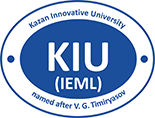 Date of publication: 23 September 2024
Date of publication: 23 September 2024
The plenary session of the 3rd International scientific and practical conference raised topical issues of digitalization in law
Kazan Innovative University hosted the plenary session of the 3rd International scientific and practical conference “Digital Technologies and Law” organized by KIU named after V. G. Timiryasov jointly with the Ministry of Digital Development of Public Administration, Information Technologies and Communications of the Republic of Tatarstan. This event brought together representatives of different branches of legal science and practice, authorities and business to discuss topical issues concerning the mechanisms of ensuring the legal regime of rapidly developing digital technologies.

The session was moderated by Ildar Rustamovich Begishev – Doctor of Law, Associate Professor, Honored Lawyer of the Republic of Tatarstan, Chief Researcher of the Research Institute of Digital Technologies and Law, Professor of the Department of Criminal Law and Procedure of Kazan Innovative University. He stressed the importance of digitalization in the modern world. “The topic of digitalization continues to be at the center of the agenda in the country and in our region, which is why we are holding a large-scale conference on digital technologies and law for the third time.”
Welcoming speeches were made by representatives of different branches of legal science and practice, and authorities.
Albert Yakovlev, Deputy Minister of Digital Development of Public Administration, Information Technologies and Communications of the Republic of Tatarstan, emphasized the need to introduce relevant technologies in public administration and the importance of participation in the conference to ensure their effectiveness.

Rector of Kazan Innovative University Asiya Vitalyevna Timiryasova noted the relevance of the issues discussed and the importance of the conference as a platform for developing important solutions at the intersection of innovation and law. She also spoke about the achievements of the University in the field of digitalization, emphasizing that Kazan Innovative University has been actively using distance learning technologies for more than 25 years, as well as conducting research on digitalization in the field of public governance and in various sectors of the economy.
“We have patented our in-house solution – electronic document management and university management system “Aidis”. We also tested the introduction of digital methods of education and socialization of people with disabilities. Our legal scholars take an active part in forming and improving the legal environment for the development of digital technologies”.

Natalia Tkachenko, Production Director at GARANT and Editor-in-Chief of “Zakonodatelstvo” (“Legislation”) Journal, highlighted that digital technologies give a powerful impetus to the development of law. She expressed hope that the Conference would touch upon such issues as the effective use of neural networks, assessment of their performance and areas in which these solutions can be applied.

Elena Avakyan, Vice President of the Federal Chamber of Lawyers of the Russian Federation and Chief Digital Transformation Officer (CDTO), emphasized that digital transformation affects each of us. She noted that law should adapt to the new realities to ensure the protection of the rights and freedoms of citizens under the changing relations and data volumes.

Avakyan also drew attention to the fact that the bar is facing new challenges under digitalization. The amount of offline crime is decreasing, while online crime is growing. At the same time, lawyers must be immersed in technology to effectively work for their clients.
The session featured presentations from leading experts in their fields. Each of them brought a unique perspective on how law is changing in the context of digital transformation.
The first speaker was Maksim Viktorovich Zaloilo, Cand. Sci. (Law) and Leading Researcher at the Department of Legal Theory and Interdisciplinary Legislation Studies of the Institute of Legislation and Comparative Law under the Government of the Russian Federation. He rendered a report entitled “Digital vector of law evolution: new approaches to research”. In his speech, he stressed the importance of studying new approaches to law under digitalization and proposed a number of ideas for further development of this field.

The next speaker was Elena Avakyan, Vice President of the Federal Chamber of Lawyers of the Russian Federation and Chief Digital Transformation Officer. She shared her experience of working in the legal profession and spoke about the challenges lawyers face in the era of digitalization. Her report “Digital transformation of the bar in Russia: milestones on the difficult way to ensuring the principle of independence of the bar” sparked a lively discussion among the session participants.

Marina Aleksandrovna Rozhkova, Doctor of Law and Chief Researcher of the Institute of Legislation, presented a report on “The concept of virtual reality: current interpretation”. She considered in detail various aspects of virtual reality and offered her vision of how this concept can be interpreted from the legal viewpoint.

The session was concluded by Maria Anatoliyevna Bazhina, Doctor of Law and Associate Professor of the Department of Business Law at Ural State Law University. In her report “Digitalization in the transport industry: legal challenges” she spoke about the legal aspects of digitalization in the transport industry and proposed a number of measures to ensure the safety and efficiency of digital technologies in this area.

The presentations were a striking example of how leading legal experts explore and analyze the changes taking place in the legal system under the society digitalization. They showed that law must adapt to the new realities and take into account the peculiarities of the digital epoch. This will ensure effective regulation of social relations in a rapidly changing world.
 prev
next
prev
next 


 Personal Area
Personal Area 




